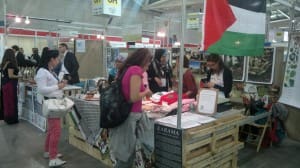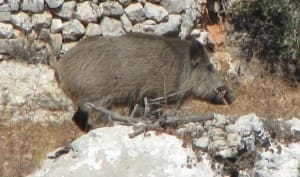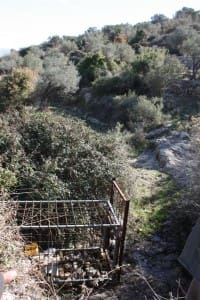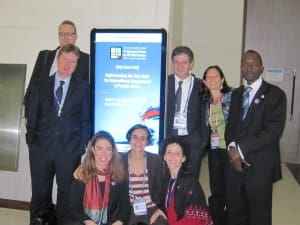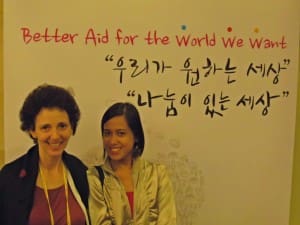Sharaka—a volunteer effort focused on ensuring a food sovereign Palestine and preserving traditional Palestinian agriculture–was invited to participate in the Slow Food Exhibition which takes place every two years in the Italian city of Turin. I was honored to represent Sharaka along with my colleague, Aisha Mansour, in this great event.
The Exhibition took place from October 24 through October 30, 2012 in the Olympic headquarters building, where we participated along with 6,000 farmers and food producers from around the world.
Throughout the exhibition, Aisha and I exhibited a range of Palestinian “baladi” products like freekey (wheat) from Deir Istya (Salfit), molasses from Halhoul (Hebron), oil and za’atar from Qira (Salfit), kishik (yogurt) from Beersaba’, and duqa’ (brown za’atar) from the Gaza Strip. We offered sample tastes of these products and traditional Palestinian foods to visitors who came in the hundreds of thousands, and we sold T-shirts bearing the Sharaka logo, which represents food sovereignty in Palestine.
A number of Palestinian institutions that work in the food industry took part in the Palestinian wing of the exhibition, including Karama, the Palestinian Agricultural Relief Committee (PARC), the Ministry of Agriculture of the Palestinian Authority, and the Fair Trade Association. The Palestinian wing received Italian and foreign visitors, especially from the US, Canada and Europe who came specifically to taste and buy products from different places around the world and to learn about the economy of food in Palestine (and here), and encourage the production of high quality, healthy food products.
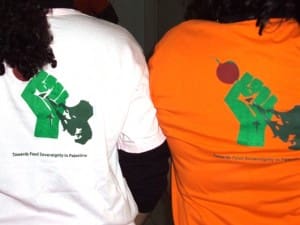 Slow Food is a movement calling for the transformation of food culture away from fast food, and a return to natural modes of food production and meals with local character. The Italian sociologist, Carlo Betrini became an advocate of the Slow Food movement by publishing a simple statement of support in 1986 in Turin, and it grew into an international movement in 1989 with the snail as a logo symbolizing Slow Food. It was intended to counter junk food, which is prepared quickly and without attention to the details of the food. Twenty-three years since its launch, this movement espouses a nutritional philosophy that brings together tens of thousands of supporters around a hospitable kitchen table that offers delicious food that is well prepared from natural sources (Wikipedia). Sharaka is Ramallah chapter if the Slow Food movement.
Slow Food is a movement calling for the transformation of food culture away from fast food, and a return to natural modes of food production and meals with local character. The Italian sociologist, Carlo Betrini became an advocate of the Slow Food movement by publishing a simple statement of support in 1986 in Turin, and it grew into an international movement in 1989 with the snail as a logo symbolizing Slow Food. It was intended to counter junk food, which is prepared quickly and without attention to the details of the food. Twenty-three years since its launch, this movement espouses a nutritional philosophy that brings together tens of thousands of supporters around a hospitable kitchen table that offers delicious food that is well prepared from natural sources (Wikipedia). Sharaka is Ramallah chapter if the Slow Food movement.
The exhibition is a momentous event that demanded a great logistical effort. It contributed to raising awareness of the importance of the foods produced around the world, and it helps producers to market their products at reasonable prices. Moreover, the importance of the exhibition is not only to present the products, but also to make it possible for farmers and producers to exchange experience and to discuss their mutual interests and how to overcome their common challenges. Also, many other related conferences and side-events are organized around Slow Food to discuss food producers’ concerns.
The exhibition space is big enough to display all the products, and includes all the facilities to process and conserve local foods, and kitchens to prepare local dishes. The event attracted several dignitaries in the opening event such as the head of the UN Food and Agriculture Organization (FAO), representatives of ministries of agriculture and municipal representatives from the host city of Turin. It was well covered by local and international media. There were a striking number of volunteers who helped, including elders and youth, students and others, who provided logistical and administrative support and smiles for the delegates.
On a personal level, I was impressed roaming the aisles, hearing traditional music from all over the world, and eating traditional foods from all over the world. I felt the world was, in fact, a small village: Ukraine on one side and India on the other, South Korea next to Brazil, South Africa and Honduras. I felt truly grateful to the organizers of this impressive event for the honor of attending. As a farmer, I felt that I am not alone, and my counterparts from all over the world share the same troubles and dreams as we do in Palestine.
As Palestinians, we felt the sympathy, love and appreciation of our Italian friends and the whole world. They packed the Palestinian wing asking questions about Palestine and the Palestinian people, and they admired the products of the land of Palestine. This gave us determination and will to complete our journey to protect our mother land, not through empty slogans, but through farming and production, and to hold dear the land that provides us life and food and dignity.
* Fareed Tammallah is a journalist and farmer from the village of Qira (Salfit) and a founding member of Sharaka.
